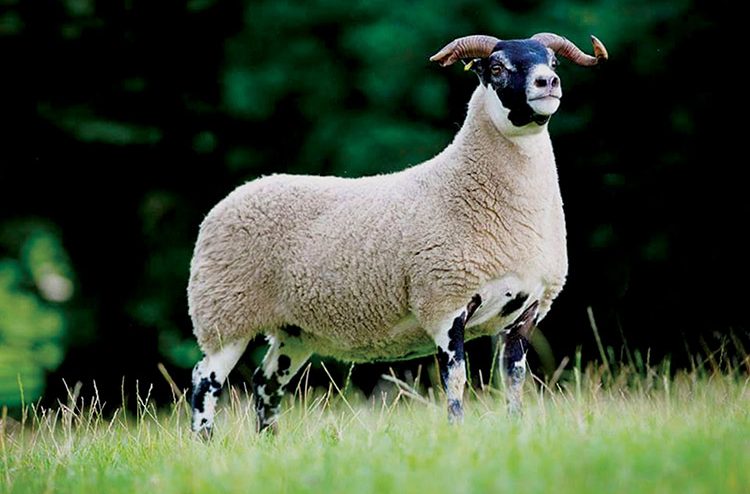
Loughash Farm near Strabane in Co. Tyrone plays host to an annual on-farm sale of Blackface Sheep every September. First held 26 years ago, the sale has become one of the largest of its kind anywhere in Ireland and the UK.
Over 300 people attended this year’s sale which took place on Saturday, September 24 and included ewe lambs, hogget ewes, two and three-year-old ewes, full and broken mouth ewes, Tup lambs, shearlings, aged Tups and Texel shearling rams. The top-quality Lanark-type sheep on show made excellent prices which pleased John and Charlie Harkin, whose Loughash Blackface flock is known far and wide.
“It’s getting bigger and better every year,” John Harkin says of the on-farm sale.
“We sold over 2,000 Blackfaces with buyers coming from as far away as France, Switzerland and Germany. But our biggest market is in the West of Ireland and in Cork and Kerry where the landscape and climate is suited to the breed. Our sheep are scrapie monitored and MV accredited which makes them eligible for export. We can arrange transport within Ireland and to mainland Europe.”
One of the top flocks in the breed, stock sires include rams to the value of £68,000. Loughash rams have sold for £40,000 and ewes for £6,000. “In 2013, we sold a six-month-old pedigree ram for £40,000 in Lanark in Scotland to Drumgrange Farm,” John recalls.
The pound’s depreciation against the euro in the wake of Brexit had a positive impact on prices at this year’s on-farm sale with ewe lambs averaging £158, hogget ewes £189 and aged ewes £140. There were 150 pedigree rams sold along with 600 ewe lambs, 700 hogget ewes and 450 aged ewes. The auction was conducted by Lawrie and Symington, who are one of Scotland’s leading livestock auctioneers and valuers.
At the inaugural Blackface Sheep Breeders’ Association Northern Ireland National Show which took place in the King’s Hall, Belfast in August 2015, for the first time Loughash Blackfaces won every senior class, including champion and reserve champion male, and champion female.
The Harkin brothers had been importing Blackface Sheep from Scotland before becoming pedigree breeders themselves. Indeed, they still buy five or six rams in Scotland every year (they also sell 20 rams per year to Scottish buyers).
“We brought back hundreds of sheep from Scotland before getting into breeding ourselves. We’ve bought a lot of very good rams over the years and have been stakeholders in rams with fellow-breeders in Scotland valued at up to £68,000. We’ve had to earn our name,” continues John.
“If they’re good enough, you’ll have a market for your sheep. We insist on quality rather than quantity. Being able to look after the customer well is also very important. We look after the delivery – it’s all part of the service.”
The Harkins keep about 2,500 ewes on their farm in Loughash, which is eight miles from the Tyrone-Donegal border and was where the first agriculture college in Ireland was established in the late 1880s. They rear 3,000 lambs per year with all the ewe lambs being kept for breeding. Any male lambs not sold as rams are finished and sent to the factory.
While most of their stock is sold at their own sale, the Harkins also sell at sales in Ballymena, Plumbridge, Co. Tyrone and Lanark. These sales all take place in October.
A type of mountain sheep, the Blackface breed are horned with black have black and white face and legs. The outstanding qualities of the breed are survivability, adaptability and versatility, with the ability to fit into any farming situation. Most commonly found in Ireland and Scotland, they are one of the hardiest breeds around. Blackface lamb is succulent, tender and flavoursome.
Blackface are believed to have descended from the wild-horned Argali sheep that inhabited central Asia in ancient times. Gradually, they spread west through Europe and are thought to have been introduced to Britain by the Danes circa 800AD. It evolved from there probably by interbreeding with other native breeds.
During the 18th century, the Blackface sheep swept north, replacing the Cheviot in the Scottish Highlands as it was better able to survive the harsh conditions and poorer grazing on the bleak mountains. Their numbers increased rapidly during that century as wool became an important product during the Industrial Revolution and the demand for meat increased in line with the growth of cities in Britain.
It was during the latter half of the 19th century, and after The Famine, that the Blackface were introduced to Ireland by the landlords who owned vast estates in the mountains along the west coast. One landlord named Captain Houston imported thousands of Blackface from Scotland through Killary Harbour in Co. Mayo during the 1850s.
Several strains of Scotch Blackface have evolved down through the years in Scotland and Northern Ireland, namely Perth, Newton Stewart and Lanark. In the south of Ireland, there are the Mayo/Connemara type, Kerry Blackface and the Waterford and Donegal types, which are very similar to the Perth strain in Scotland. There has also been a lot of crossing and merging of the types in recent years, especially in Scotland where the Newton Stewart and Lanark are almost totally merged.
Loughash Farm Blackface
21 Loughash Road,
Dunamanagh,
Strabane,
Co. Tyrone BT82 0QL.
John’s mobile: 078 02347442
Charlie’s mobile: 077 34140186
Taken from Irish Tractor & Agri magazine Vol 4 No 9, November/December 2016